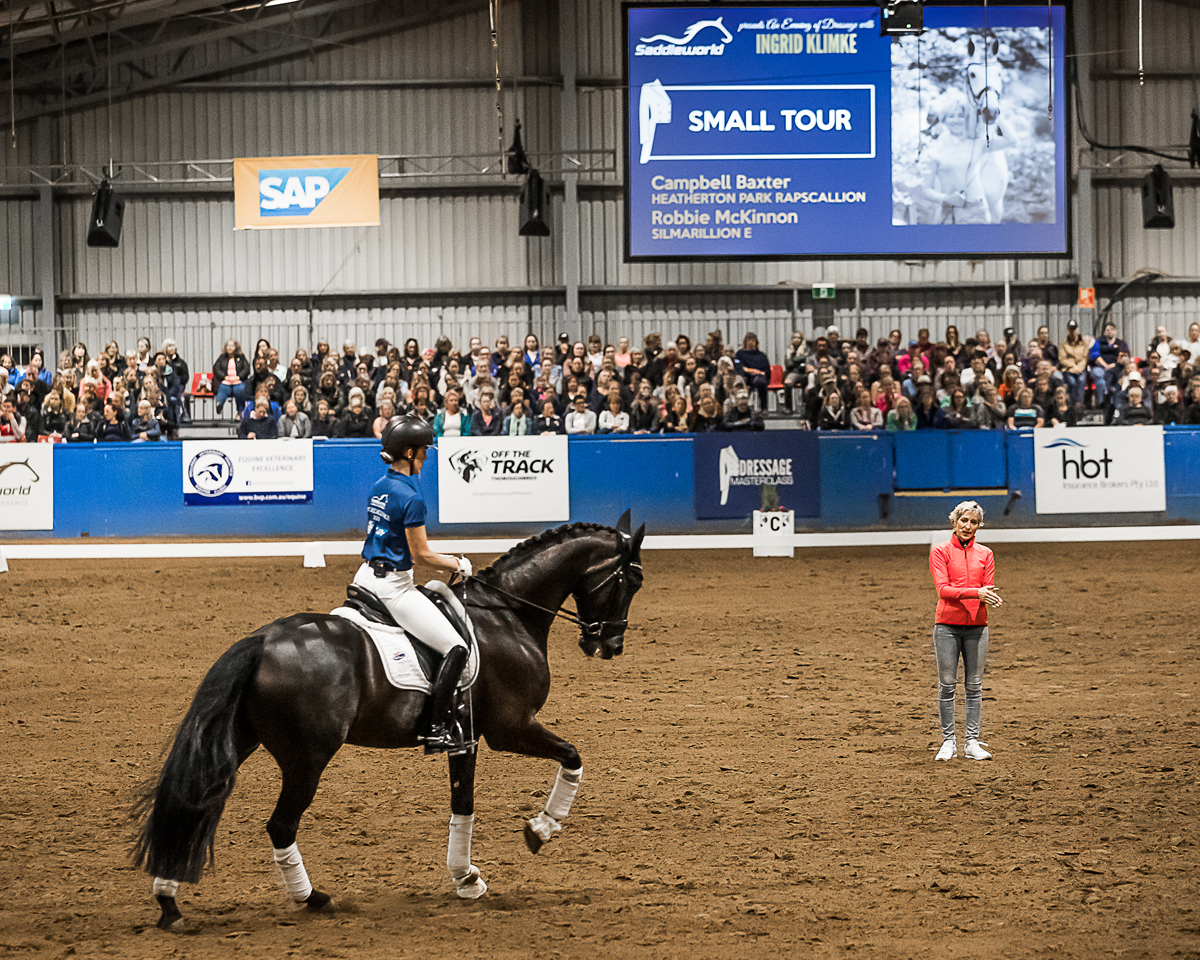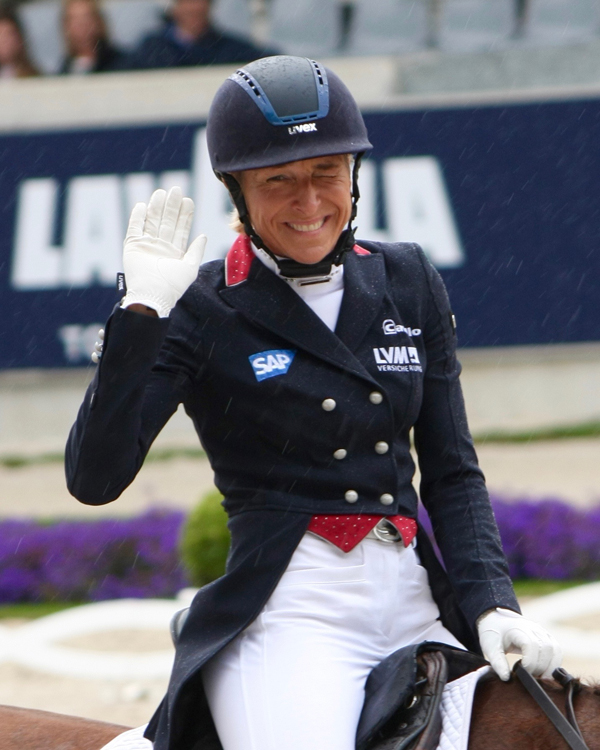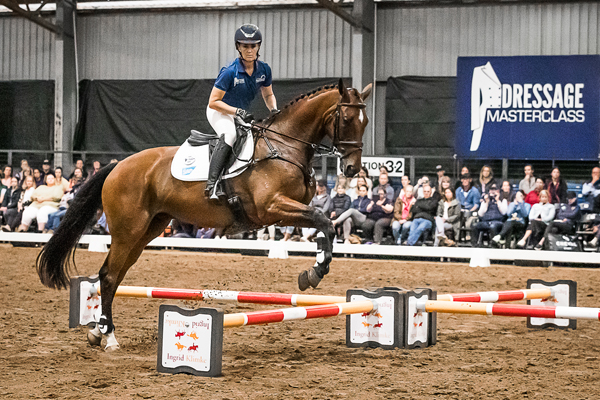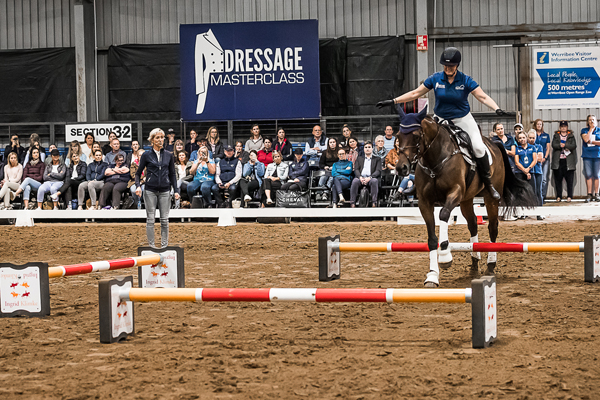In Australia for a masterclass, Ingrid Klimke, the German Olympian dressage and eventing great, opened up at length to Equestrian Life on what drives her and how she relates to horses.
Ingrid Klimke is truly one of the giants of our sport. She has represented Germany at five Olympics, won two team gold medals (on the thoroughbred Butts Abraxxas) and a team silver on current champion, SAP Hale Bob. She was on the short list for the Tokyo Olympics in both the eventing (Hale Bob and SAP Asha P) and dressage (Franziskus). She has won many gold medals at World Equestrian Games and European Championships.
Ingrid is seen as one of the champions of the so-called classical approach to horse training. Her father, Reiner Klimke, was a giant in the sport in his day, winning gold medals in the dressage at six Olympic Games. He also competed at the Olympics in eventing, and was active in promoting the principles of classical training. So, Ingrid has an amazing depth of experience in both training and the competitive sport.
Ingrid paid a flying visit to Australia as a guest of Dressage Masterclass in February to do her only masterclass presentation for 2020. (You will find reports of the dressage lessons from this masterclass here).

THE IMPORTANCE OF THE RELATIONSHIP
I was privileged to interview Ingrid, but rather than go over the training I wanted to find out more about how Ingrid thinks. She gives a wonderfully thoughtful and at times unexpected interview. Ingrid says that to her: “The most important thing is the relationship with the horse. I want to develop a trustful partnership where we can really rely on each other. Especially in eventing, where it is not always an exact science what happens on cross-country. The rider is responsible for the right line and the right speed, but then I have to give the job to my horse. Also in dressage, of course they have to be obedient, but they shouldn’t lose their personality. They should enjoy what they do and also have their spirit.”
Regarding your relationship with horses, Ingrid says: “With stallions you must be sure that the stallion accepts you from on the ground and from on top, otherwise it can be really dangerous. With a stallion I will be very clear, especially if they are disobedient. If they cross one line, I will right away stop and correct them.
“It’s different with mares because you let the leading mare be the leading mare; let her think that it’s her idea. I would never start an argument with a mare that I don’t think I can win, especially the strong-minded mares. The leading (dominant) mares will go forever for you. Up to a point they accept you, but you must be sure you don’t overdo the obedience. With a mare I might be more ‘you sweet princess’.
“With a young horse, then I might be like a parent. There should be very clear lines (boundaries). But with an established competition horse it is more like an old friend, like a partner; someone that I trust. You give everything to them and they give everything to you. It’s taking and giving from both sides. When you have that horse of a lifetime… for me it was Abraxxas. He wasn’t a very good showjumper and I learned that I had to accept that that was him. You can’t change everything.”

How do you make a good relationship with a horse?
“I don’t let them fall into traps, especially with the cross country. Go step by step. Don’t ask them too much, don’t frighten them. Train step by step. Don’t leave steps out. Even with a talented dressage horse, it’s about patient training over many years to build the horse. Be very careful not to be overexcited yourself. Build them physically and mentally, slowly. Sometimes, just have time to be easy.
“I like to spend time on the ground with them. At the big shows there is time; we only have a few horses there and I can get to know them better. I like to be the groom, take them for a walk. We play around with them, figure out how they are. We do the groundwork, pushing, walk side by side, let them come. Once they know it, we don’t do it much. Bobby knows it now and he gets bored, so we don’t do it — but I did a lot when he was young.”
Ingrid emphasises that it is through good training that a good relationship is built.
“The most important
thing is the relationship
with the horse.”

How do you know that you have a good relationship with the horse? What are the indicators?
“I just feel that they enjoy their work. They are happy to work. They look forwards when you come to the stables. They look a little bored with the groom and they become more alert when you come. They might want a little cuddle after the work.”
How do you evaluate the quality of a rider’s relationship with their horse? What do you look for?
“I always look for whether the horse is with the rider or whether the horse is somewhere else. Where is the horse’s attention? I think the half-halt is really important. The half-halts are explaining to the horse that whatever else is going on around you is not important. ‘Stay with me’. If you see that the horse is paying attention to all the other things but not the rider, you have to make sure that the horse thinks that the rider is more interesting than the other things. This can be difficult, especially with a hot horse who is naturally more interested in things around him, but you must teach them that you are more interesting.”
There is a saying we hear that ‘there is no room for feelings in horse riding’. What do you think of that idea?
“I am very emotional. I have had it that I might know that an owner might sell a horse and I can try to be unemotional, but even if I try to be not connected I have still ended up heartbroken. It’s like losing a member of the family. Either I have the connection or I don’t want to be with that horse.”
So, love is important, what about other feelings? What about anger?
“I have really learned that the horses don’t try to do the wrong thing. I have learned to be patient. Horses have taught me this, to be patient. In more than 20 years of training I have learned to be more calm and patient. Sometimes we can’t do what I want to achieve today, so I have to do something else. I have learned so much from the horses.
“The more pressure there is, the more I want to do it right, so the calmer I have to be. It’s more a competition instinct, it’s positive ambition. Chris Bartle (coach of the German eventing team) has a saying, ‘Luck is where preparation meets opportunity’. The more that you have done everything you can before the competition, the more you can be positive. It’s the excitement of the day on the day. “I think horses feel the positive excitement of the competition. Some horses — even if you have done nothing — their instinct is quicker than you think. You can give the horse confidence by being confident, and help the horse to enjoy the competition if you enjoy it. You can give the horse doubt if you have doubt; they can be very sensitive.”

I am interested in how you make decisions. We can make decisions by using logic, or we can make them by intuition. For example, when you choose a young horse, is it logic or intuition?
“It is so much intuition. There have been horses that my intuition said yes but my logic said no, and when I have followed that up they have been good horses. And it is intuition when I walk a course. The first course walk is the most important. I try to walk it looking through the eyes of the individual horse; each horse is different. When I am sitting on the horse, I try to feel what they are feeling. I trust my intuition — sometimes I am wrong — but I try to bring it into my training.
“It is also true with owners too, and with students. The team must have a good way of working together. Someone may not do anything wrong, but they just may not be a good fit. So now I will say, ‘maybe you are better off somewhere else’. In German the word is verbindung — connection — it’s about connection to yourself’. (Of course, I am excited to hear her emphasising the importance of connection, as it is so fundamental).
“In riding, there is also the brain side. I try to stop the negative thoughts: I say, ‘yes you can make it’. I am interested in the psychology; I read books and find what suits me. The mental training can be very important… imagery and focus. Chris Bartle was a good mental trainer. He taught us, ‘Look to yourself, be focused, not thinking of the other competitors or the judges’.”

What about things you have learned from science?
“We use heart-rate monitoring, we measure lactate. The veterinary side is very scientific. I like to learn what we know about how horses are in nature, living in a herd. That can help us know what horses like and keep them happy and healthy. But I am not a person to change the basics, from what I learned from my father.
Isaac Newton said: “If I have seen further than others, it is because I have stood on the shoulders of giants”. You have stood on the shoulders of giants; your father was a giant in the sport. If he was here, what do you think you have learned that he would be interested in?
“He grew up in a different time when women were not allowed to do things. For example, they thought that women could not do cross country, that they were not tough enough. The sport has changed so much. I think he would laugh about how much the women have taken over. He was a typical man, a strong man and a leader of men, the ruler of the family. When he was here there was one voice, one boss.
“If he was alive it would take him some time to understand how we do things in our team, but then he would admire how we do things. There is much more a team approach. Everyone can contribute. (This was an unexpected and heartfelt answer, an answer about leadership style and relationship.)
“He always said, ‘It is not Ingrid that loves the animals, it is the animals who love Ingrid’. He saw that connection. He would be interested to see how my relationship with the horses has developed.
“I try to help my daughters (Phillipa, 10, and Greta, 17) to appreciate what we have, to leave the stress of school and all the things they do away from the horses. Since I became a parent, I have become even more thankful for my wonderful life. We can do things together. I can keep my horses. We don’t have to sell them because of the way we have built the business, with competition horses (Ingrid retains a majority share of her competition horses), and with books and clinics. I am so grateful for what we have all together built up. Ten years ago I wasn’t sure that it would work out. I love what I do. Everyone contributes.”
(Ingrid’s marketing manager Anna, who also came to Australia, comments that everyone in the team, and the business partners, are all grateful for Ingrid’s leadership. “We are so lucky that we have Ingrid, it’s joyful work,” Anna says with obvious feeling.)
What makes a podium rider a top 3 rider as opposed to a ‘normal’ elite top 8-10?
“I think you must have a lot of energy to be able to give it your all. There is a lot of power in wanting to win and wanting to be on the podium. If you want to reach something that others don’t reach then you have to do more than others. You have to do more and do it better. You have to step back and think, ‘what can I do better?’ not just look at the others and think that they have something better.”
Ingrid certainly impressed everyone at the masterclass with her indefatigable energy. She did the masterclasses, signed books and had barely a moment to herself. She was so generous with her time. I had missed my appointment with her due to rain and traffic, but she was so kind to agree to meet with me the day after the masterclass. She impressed me as a truly outstanding person. It was a real privilege to meet her. No doubt she will continue to be a driving force inspiring people with her teaching and her training to build those great relationships, to foster the enduring principles of classical training.
Watch EQ Life’s video recap from Ingrid Klimke’s masterclasses here.

OFF THE TRACK STARS SHINE AT MASTERCLASS
Ingrid Klimke’s SAP Eventing Masterclass and SAP Eventing Short Course Demonstration attracted quality eventers from around the country. As we know, many off the track Thoroughbreds transition to successful careers in the eventing world, and a number of these success stories were on display during Ingrid’s lessons!
“The more pressure there is,
the more I want to
do it right.”

Niki Rose’s Dreamcatcher is an unraced 2012 gelding by Sebring. Registered with the Australian Stud Book as “Florida Boy”, he is unraced however was initially trained for racing. Niki and Dreamcatcher are aiming to compete at 3* level in 2020.

Amanda Ross’s Koko Popping Candy is a 12-year-old mare by Bianconi. She raced as “Gothic Medusa”, with 7 starts and 1 win. Koko Popping Candy is one of Australia’s top eventers, aiming to compete at the Tokyo 2020 Olympics.

Stacey Halstead’s Belle Arena is a 9-year-old mare by Arena. She raced as Doomkitty, with 19 starts and 1 win. This year Stacey and Belle Arena are aiming to reach 2* level eventing.
Racing Victoria’s Off the Track program was an event sponsor. To find out more about off the track horses, visit www.racingvictoria.com.au/offthetrack

